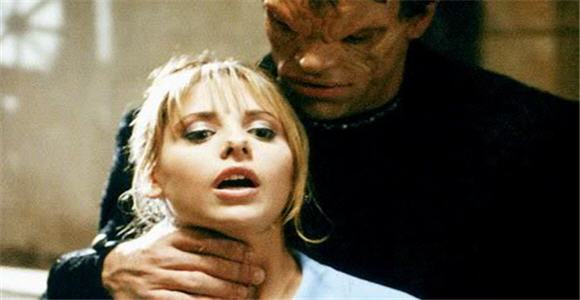Reconsidering the Feminism of Joss Whedon
Essay

Dollhouse
Calling to mind Henrik Ibsen’s feminist treatise, Dollhouse was Whedon’s latest foray onto the small screen. However, Dollhouse is about as feminist as Sucker Punch is – that is to say, not very. It actually most perfectly embodies Whedon’s love of male fists in female faces. At least with Buffy, you could tell yourself that she had powers and could stomach it. With Echo (Eliza Dushku), prone to cuts and scrapes of the most human kind, you can say no such thing. In a rough guesstimate, 93.4% of the show’s episodes involve Echo getting pummeled. Sometimes she’s just generally beaten up, but a surprising number of the episodes involve her getting directly punched, in the face, by a man. It’s extremely uncomfortable, but it indicates a generally pervasive, less spoken male fantasy – the desire to perform harm, with one’s own two hands, on a woman who is stronger.
If you’ll permit the academic tangent, Dollhouse merits recollection of film critic Laura Mulvey and her brilliant thesis, which identified the gaze of the audience in film (or television, updated) as male. It also identified the gaze of the writer and director as male, and the ways in which that manifests itself onscreen. Mulvey found that a disturbing thread had emerged in cinema, a psychological expression of male insecurity: when a female character is strong or otherwise opaque to the male viewer, there are generally two options at hand. The visual medium tends to answer the anxiety of the male by “demystifying the mystery, counterbalanced by the punishment of the guilty object.” What this means in layman’s terms is that the woman must be unmasked (usually by sexual intercourse) or punished with harm for refusing to submit. In Dollhouse, we are treated to both.
Echo is the ultimate male fantasy – she is a woman that literally anything can be done to for the right amount of money, with those actions then simply erased afterward. See, it’s all right, because she (and the other dolls) won’t remember! The show perpetrates the worst kinds of violence on its female characters. Over the course of the two seasons on-air, Echo is repeatedly used for intercourse and made to pretend she enjoys it, one woman is removed from doll status because of a physical deformity, another female is steadily and terrifyingly raped by her male handler – and even the term “handler” suggests a male role intended to actively control. (By the way, let’s recap: The Watcher’s Council? Predominantly male. The Alliance? Predominantly male. The handlers and Dollhouse’s client base? You got it. In each of these shows, the largely faceless entities determining the fates and roles of women are male.)
And it’s not enough to say that Joss Whedon puts this on display to dismiss misogyny, because the show seems to revel in Echo’s condition for a good part of the first season. Putting her in a variety of sexy spandex and ever-more dangerous situations is a thrill, and the audience, watching, also thrilled, is complicit in Echo’s subjugation. By our very interest in Echo’s changing personalities, we create the need for Dollhouse in the first place. Many men want to see women imperiled; Dollhouse delivers. And a viewer must do all kinds of mental gymnastics to push that underlying reality aside.
I’ll add a disclaimer that, of course, not all men want to see women physically abused. Many men I spoke to for this article expressed a discomfort with these kind of scenes. However, it’s interesting to note that a 2002 study found that men who watched violent or sexually explicit media showed increased aggression toward women and were more likely to think there were circumstances where this violent behavior might be acceptable. It’s not as though Dollhouse is going to turn mild-mannered men into wife-abusing boors, but the pervasiveness of portraying brutality against women with a pretext of them being able to take it might bolster some viewers’ nascent misogyny.
In Conclusion
I haven’t seen Angel, so cannot comment, but have heard some interesting things about Cordelia’s story arc. Dr. Horrible’s Sing-Along Blog was fairly benign, though of course Felicia Day was a nigh non-entity. As to his film work, I loved Toy Story. I do want to say that I find Joss Whedon’s works extremely entertaining, but that doesn’t mean they are impervious to critique. What do you all think? Is Whedon a paragon of feminist virtue? Should I be ashamed of myself? Discuss amongst yourselves.
Natasha Simons is a freelance writer living in Brooklyn, if you can imagine such a thing. She blogs here.
Have a tip we should know? tips@themarysue.com